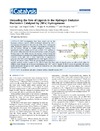Identificador persistente para citar o vincular este elemento:
https://accedacris.ulpgc.es/jspui/handle/10553/75030
| Título: | Unraveling the Role of Ligands in the Hydrogen Evolution Mechanism Catalyzed by [NiFe] Hydrogenases | Autores/as: | Qiu, Siyao Azofra Mesa, Luis Miguel MacFarlane, Douglas R. Sun, Chenghua |
Clasificación UNESCO: | 221001 Catálisis | Palabras clave: | H2 production Spin effect Enzymatic catalysis Bimetallic enzymes DFT |
Fecha de publicación: | 2016 | Publicación seriada: | ACS Catalysis | Resumen: | DFT investigations have been carried out on the hydrogen evolution reaction (HER) mechanism followed by [NiFe] hydrogenases. Calculations on the active site of the [NiFe] hydrogenase from Desulfovibrio vulgaris str. “Miyazaki F” reveal that H2 is formed as the final product through the “singlet multiplicity” pathway. Nonspontaneous reaction energies can be seen for both H+/e– additions to the reactive sulfur atom from the truncated cysteine residues, being the limiting steps of the whole reaction. In contrast, transfers toward the metal environment to produce the bridging hydride and the bonded H2 molecule at the Ni-C and I2 steps, respectively, are spontaneous processes. Our DFT results highlight the role of the ligands attached to both the Ni and Fe centers. When the protein ligand environment is spatially confined, reaction energies for the HER are lower than those when the ligand carbons are able to freely adjust. In addition, larger changes can be seen on interchanging the [CN]− and CO ligands on the Fe center; in particular, the energy profile dramatically changes as [CN]− ligands are replaced by CO. These results may guide materials synthesis efforts toward optimized HER catalysts. | URI: | https://accedacris.ulpgc.es/handle/10553/75030 | ISSN: | 2155-5435 | DOI: | 10.1021/acscatal.6b01359 | Fuente: | ACS Catalysis [ISSN 2155-5435], v. 6 (8), p. 5541–5548 (Julio 2016 |
| Colección: | Artículos |
Citas de WEB OF SCIENCETM
Citations
24
actualizado el 01-mar-2026
Visitas
141
actualizado el 10-ene-2026
Descargas
230
actualizado el 10-ene-2026
Google ScholarTM
Verifica
Altmetric
Comparte
Exporta metadatos
Los elementos en ULPGC accedaCRIS están protegidos por derechos de autor con todos los derechos reservados, a menos que se indique lo contrario.
